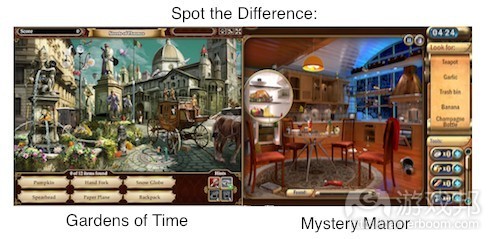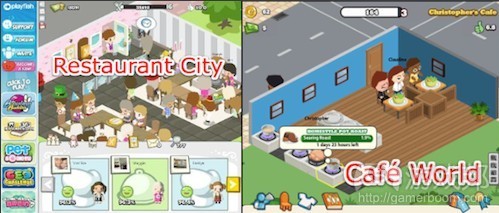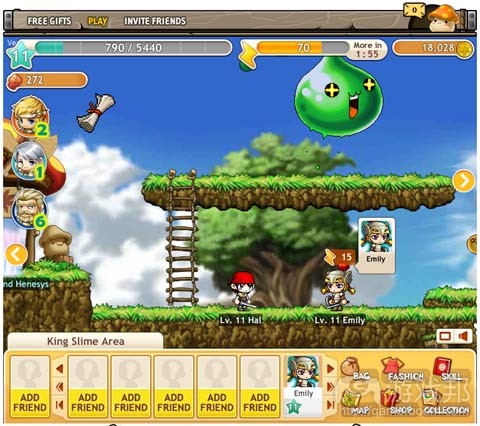每日观察:关注社交游戏创意雷同现象(7.28)
1)DeNA及其美国子公司Ngmoco日前宣布向全球发布运行于Android操作系统的Mobage手机社交平台。
Mobage目前已在美国、中国、日本的Android Market发布,将与Gree/OpenFeint、苹果Game Center、EA的Origin以及Facebook即将推出的下一代移动技术服务形成竞争之势。
2)Facebook游戏开发商Kixeye近日宣称,另一家重量级社交游戏公司Kabam即将推出的《Edgeworld》窃取其创意,侵犯了热门游戏《Backyard Monsters》的版权,不排除向法院提起诉讼的可能。
Kixeye首席执行官Will Harbin称事发原因是有不少用户看到《Edgeworld》后,误认为该游戏与《Backyard Monster》出自同一家公司之手,因而向Kixeye而非Kabam请求客服支持。
Harbin表示游戏模仿现象并不罕见,但《Edgeworld》明显克隆了《Backyard Monsters》的一些游戏机制,不但游戏玩法雷同,新手教程、建筑菜单资源等元素都有相似之处(详见以下由Kixeye提交的两款游戏截图)。而Kabam则回应称《Edgeworld》(游戏邦注:该游戏尚未正式发布,目前仍处于内测阶段)并没有抄袭前者创意,其首席执行官Kevin Chou表示,Kabam团队是从电影、流行文化、科幻小说、文学、历史以及玩家等多处来源获取灵感。
insidesocialgames观察者认为,这一领域近期频频发生的游戏雷同案例引申出两个问题:一是所谓的“模仿”与“获取灵感”究竟有何区别?二是这种模仿现象对整个行业究竟有何影响?
第一个问题带有主观性,当《Backyard Monsters》刚刚亮相时,就有观察者将其与经典PC策略游戏《Envoy》和《文明》进行比较;而Kabam的《Kingdoms of Camelot》在2009年露面时,同样有人将它与这两款PC游戏进行对比。有人认为,有些游戏机制已被证明是一种有效而成功的设置,它们已经赢得开发商和玩家的信赖,所以仍将继续出现在未来的游戏项目中,这也正是《Gardens of Time》和《Mystery Manor》这类寻物解谜游戏,《Empires & Allies》和《Army Attack》这种异步战斗游戏彼此颇为相似的原因。
从流量和营收角度考虑,克隆游戏在Facebook的确不失为一种安全稳妥的做法。例如《Restaurant City》和《Cafe World》发布时的风格就极为相似,两款游戏运营两年后仍保持20%以上的用户留存率。克隆现象出现的另一个重要原因是,Facebook并没有制定反对复制、模仿游戏的规则,并且仅有一小部分开发商敢于起诉其他公司,最常见的案例是Zynga因此事起诉或者被起诉。
3)韩国游戏公司Nexon日前宣布Facebook游戏《MapleStory Adventures》结束封测,正式向玩家开放服务。据AppData数据显示,截止封测日期,该游戏在Facebook的MAU是8万4728。这款游戏的Facebook版本是一款常规的RPG,并非《MapleStory》这种MMOG。
玩家在游戏中的任务是杀死怪物,从而获取经验值以及人物装备。其2D平台与原来的MMOG版本相似,但采用的是异步玩法;它的社交功能包括赠送礼物,以及让玩家好友共同解琐相关内容等要求。
4)据games.com报道,社交游戏开发商Zynga日前再次推出一项用户调查,或将根据用户反馈决定下一款游戏创意。该调查问卷中包括6种选项,其中两项与中世纪的《三个火枪手》和亚瑟王圆桌会议有关,其他内容还涉及超自然现象和功夫等题材。
其中有些故事情节添加了一些细节描述,例如地理位置名称,游戏背景发生于一个名为Oddwater的海边小镇,玩家及好友都拥有超自然能力,可以“培育魔法植物和生物”等。观察者据此推测,Zynga或许已经在着手制作这类题材的游戏,或者已经采纳了其中一些玩法和设置。
5)Digital Chocolate最新推出的《Millionaire Boss》这款游戏发布仅两周左右,但已在上周五位居Facebook新晋游戏榜单第二名。据AppData数据显示,《Millionaire Boss》当前的MAU是39万1984,DAU是2万9978。
玩家在游戏中的任务是创建和管理一家工作室,为员工和CEO等不同人员购买各类办公桌,然后招募好友和NPC员工,让工作室投入运营并产生利润。不同的桌子用途不同,其产生的效益也存在差异。当一名员工被指派到某张办公桌上时,玩家就可以要求对方在规定时间内完成任务,有些任务仅需数分钟就能完成,有些则需要数小时甚至几天才能完成。任务完成后,系统将会为玩家提供相应的虚拟货币和经验值奖励。
该游戏还支持玩家个性化装饰自己的工作室,互访好友的工作室。游戏中的所有盈利来源均为Facebook Credits系统,有些道具可用游戏自身虚拟货币cash兑换,有些则需要使用Facebook Credits购买。
6)在本周DAU增长最快的Facebook游戏榜单上,RockYou旗下的《Zoo World 2》位居榜首(当前DAU是94万3523)。由LootDrop开发的《Cloudforest Expedition》,将于今天夏天通过RockYou发行。
本榜单上表现较出众的是博彩类游戏,例如居于第二的《The Pokerist Club》以及第四名《Pool Tour Live》。值得注意的是第三名《Battle Pirates》(当前DAU是17万7825),该游戏出自《Backyard Monsters》开发商Kixeye(原名Casual Collective)之手,它支持玩家在一个小岛上建设海军基地,派遣战舰出征与其他玩家进行对战。(本文为游戏邦/gamerboom.com编译,如需转载请联系:游戏邦)
1)DeNA and Ngmoco launch Mobage mobile social network across globe
Dean Takahashi
DeNA and its American subsidiary Ngmoco announced today they have launched the Mobage mobile social network in English-speaking territories around the globe.
The Mobage service sits on top of Google’s Android operating system and essentially creates a portal and social network for games. The service is a platform for developers to deploy their games so that they can be discovered and shared by mobile game users. Already launched in Japan, Mobage is generating $1.3 billion in revenues for DeNA. By taking it worldwide into the Android market, both DeNA and Ngmoco hope the platform will be even more lucrative.
The two companies have been working on the next-generation mobile social network since Tokyo-based DeNA acquired San Francisco-based Ngmoco in August for up to $403 million. DeNA’s Japanese-language Mobage service has 30 million users, who largely play on feature phones. Combined with Ngmoco’s ngcore technology, Mobage is now refashioned for the English-speaking smartphone gamer.(source:venturebeat)
2)Clone Wars: What Copycats Really Do To The Social Games Industry
By AJ Glasser
Yesterday, Backyard Monsters developer Kixeye sent a letter to press representatives claiming that Kingdoms of Camelot developer Kabam “copied our game” with its upcoming title, Edgeworld. Kixeye is calling for action on the part of the social games industry — but it’s not clear what action anyone should take.
Backyard Monsters is a real-time strategy game released in May of 2010 where players harvest resources to construct a base that eventually produces different types of monsters. These monsters can be sent out to attack other players’ bases, thereby netting more resources. When the game launched, it had a gender neutral art style with arguably “cute” monsters. Since that time, Kixeye has retouched the art for more “male” appeal and added a series of gameplay tweaks and new features that enhance the RTS elements of the game.
Edgeworld is a space-themed real-time strategy game in development by Kabam that’s been live on Facebook in “evaluation mode” since June. Kabam has asked us to withhold detailed descriptions of the game’s mechanics as part of a reviews embargo. In the open letter to the social games industry, Kixeye CEO Will Harbin claims that, “There is no question that the engineers of Edgeworld had Backyard Monsters open in one window while they coded the copy in another.” Included in the letter is a side-by-side comparison of the two games (Backyard Monster on the right):
When asked for comment on Kixeye’s accusation, Kabam CEO Kevin Chou replied to all press outlets with the following statement: “Our team draws ideas and inspiration from many sources, including movies, pop culture, science fiction, literature, history and, most importantly, from our players. We’re flattered by the fact that others in the industry are commenting on Edgeworld. It validates our belief that Edgeworld is a great game worthy of attention, and we’ll have more to share about the game soon.”
The question for us is a two-part affair: 1) When do we call it “copying” as opposed to “drawing inspiration” in social games and 2) what impact does copying really have on the industry?
The first part is a subjective argument. When Backyard Monsters was first released, our ISG reviewer compared it to established PC strategy games Envoy and Civilization. When Kabam’s Kingdoms of Camelot was released in 2009, it was also compared to Envoy and Civilization. One could argue that all strategy games — be they real-time or asynchronous — will be compared to other strategy video games dating all the way back to 1992 PC game Dune II. Some mechanics implemented in certain games, should they prove effective, will consistently turn up in future games made by other companies because that mechanic is vetted for developers and trusted by players. The same holds true for other game genres on Facebook, which is why its very easy to spot similarities between Gardens of Time and Mystery Manor in the hidden objects genre and between Empires & Allies and Army Attack in the asynchronous combat genre.
“It’s a bit of a gray area,” Harbin admits to ISG. “You kind of call it when you see it.” Even so, he says, Kabam very clearly crossed a line in developing Edgeworld. “There are just way too many similarities between the games to call it a [game that used Backyard Monsters] as a starting off point. Users have come to us to ask if we licensed the Backyard Monsters engine to Edgeworld. Some of our users are even asking us for support on it. That’s a pretty compelling argument that it’s [too] similar.”
Even if you could call a game a clone without a second thought, it’s not something that can immediately dismissed as a bad thing. From the traffic and revenue perspective, clones have actually performed quite well on Facebook. Take, for example, Restaurant City and Cafe World. The games looked identical at launch and both went on to achieve monthly and daily active users in the millions. Both games are still running almost two years later at or above 20% retention. Other clone-heavy genres like farming sims and aquarium games are still getting new entries that reproduce identical game mechanics to the earliest titles and those games have usually found traction. Most important of all, Facebook has no rules against copying and only a handful of larger game developers have ever publicly pursued legal action against other developers perceived as copying its games. It’s usually Zynga doing the suing or the one being sued.(source:insidesocialgames)
3)MapleStory Adventures Launches on Facebook Today
By Carolyn Koh
Having been in the works for many months, MapleStory: Adventures is Nexon America’s foray into the social game space and it takes its most famous online property the massively-multiplayer online role-playing game MapleStory to the Facebook platform.
MapleStory: Adventures is in the process of being entered into our traffic tracking service, AppData. Facebook currently lists the game as having 84,728 monthly active users as of the end of the game’s closed beta period.
The game on Facebook is not an MMOG but a regular RPG. Players receive quests and kill creatures to gain experience points and equipment for their characters. The game is a 2-D platformer and looks and plays remarkably similarly to the MapleStory MMOG, and players will recognize the MapleStory style characters, art and humor.
In place of synchronous play with friends as expected in MMOGs, MapleStory: Adventures allows players to hire their friends characters to party with them in an asynchronous manner. That is to say, the computer animates the characters rather than players behind a keyboard. Other social features include the usual gifting found in many other Facebook games, and the requirement for a certain number of friends in order to unlock portions of the game.(source:insidesocialgames)
4)Zynga throws out new game story ideas in another player survey
by Brandy Shaul
Back in June, Zynga released a fan survey that asked players to give their opinions on potential game ideas, ranging from becoming a mogul in the music business to taking to the high seas as a pirate. Either those ideas have been tossed aside for the moment, or Zynga plans on working on multiple games at once, as they’re back again with another survey that seems to hint at future story ideas for games.
To be specific, we aren’t told that these are potential games-in-the-making, but are rather asked which of these stories we’d be “most interested in exploring.” There are just six options available, with two dealing with medieval times, the Three Musketeers and even King Arthur’s round table. The others range from seeking out paranormal phenomenon and ghost-hunting to living in the forest, studying the art of kung-fu.
Some of these stories actually have a bit of intricate detail included, such as names of locations, which makes me think (ok, hope) they might be more than just the results of a brainstorming session. For instance, we’re given a particular story, set in a “small coastal town of Oddwater,” where we and our neighbors have supernatural powers. We’d be able to grow “magical plants and creatures,” and dabble in witchcraft with spells and potions. Put two and two together, even with just this single example, and it seems as though Zynga might have already begun production on some of these ideas, or at the very least, are toying around with how gameplay could be involved, rather than just storytelling. That’s all speculation of course, but my interest is definitely piqued.(source:games)
5)Digital Chocolate’s Millionaire Boss is Moving Up in the Business World on Facebook
By Randy Nelson
Providing an escape from the country’s current budgetary woes, Millionaire Boss is Digital Chocolate’s micro-level take on the concept of city-building and management, condensing the gameplay into an office setting and casting players as a business tycoon. The game only just launched a couple of weeks ago and debuted at No.2 on our list of emerging Facebook games last Friday.
According to our traffic tracking service AppData, Millionaire Boss currently has 391,984 monthly active users and 29,978 daily active users.
Millionaire Boss tasks players with building and managing an office of workers plugging away at unnamed tasks to make the company money. Players must purchase various types of desks from basic employee to CEO to build and then staff either with friends (for free) or non-playable characters (for an in-game currency fee). The type of desk determines the sort of work that can be done at it and, in turn, how much money it can produce once occupied. When a worker has been assigned to a desk, the player can give them timed task to complete, some requiring mere minutes, others hours and days. Once complete, these tasks reward the player with cash, experience and bonuses that are distributed to nearby workers automatically.
In addition to desks and workers, players can place various decoration items and performance boosting “perks” like large-screen TVs to indoor aquariums to zen spas. These perk items help expand the number of people the player may hire, thus bringing in more money and necessitating the purchase of office expansions.
Recruiting friends to desks and specific office areas is one of the social aspects of the game. Friends do not need to opt-in to work at desks, but they do need to accept requests to fill roles in specific office areas (e.g. a “Loudmouth” for the “Small meeting room”). Players can visit friends’ offices and help motivate employees for bonus cash and experience points.
Certain items required for construction, like brooms and screwdrivers, are also available via friend gifting. An in-game leader board displays the player’s position relative to their most successful friends in terms of financial holdings and accomplishments can be pushed onto friends’ Walls.
Monetization in Millionaire Boss come from spending Facebook Credits on everything from gameplay boosting items and premium decorations to the construction materials needed for perks or special office areas. Normal desks and decoration items can be purchased with the game’s soft currency, cash. Avatar customization items, including hairstyles, shoes and clothing, are also available for purchase – some for cash, some only for Facebook Credits.(source:insidesocialgames)
6)Zoo World 2, The Pokerist Club, Battle Pirates Lead This Week’s List of Fastest-Growing Facebook Games by DAU
By AJ Glasser
Zoo World 2 (here shown as Zoo World) climbs to the top of this week’s list of fastest-growing games by daily active users as RockYou continues to expand on its ad platform. RockYou’s newest game from developer Loot Drop, Cloudforest Expedition, is now set to release in late summer.
Moving on down the list, we see a healthy mix of casino or pub-type games like The Pokerist Club and Pool Tour Live. Casino darlings Slotomania and DoubleDown Casino make the cut, too, as both games appear to be enjoying steady growth patterns that extend to monthly active users. Mynet Çanak Okey and Poker Star make appearances as well.
Battle Pirates as a real time strategy game from Backyard Monsters developer Kixeye (formerly Casual Collective). Players build up a naval base on a small island, eventually constructing fleets of warships to send out to sea in combat against other players and a non-playable enemy faction. In combat, players can allow the computer to control their units or manage individual units’ attack trajectories by clicking single ships and then clicking a place on the combat map to send it. In player versus player combat, two people can fight against one another or the computer will step in to play for offline players.(source:insidesocialgames)















































 闽公网安备35020302001549号
闽公网安备35020302001549号